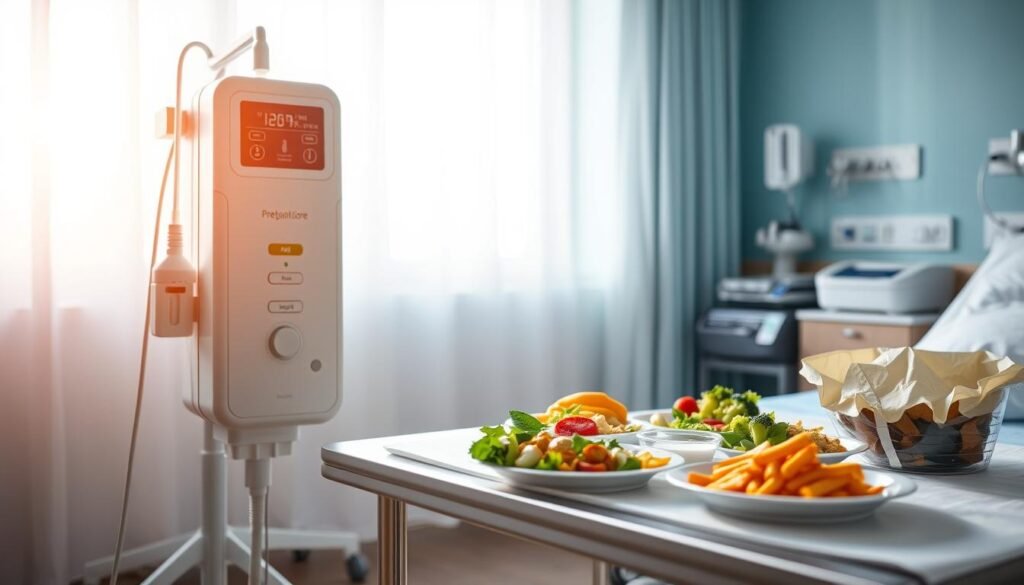Is No Appetite a Symptom of Pregnancy? Early pregnancy symptoms can be unpredictable and varied. Appetite changes are common for many women. Understanding these changes is key to pregnancy health.
During early pregnancy, women often see big changes in their eating habits. These changes are due to hormonal shifts and other factors.
Appetite changes are normal in pregnancy. Sometimes, a loss of appetite can signal early pregnancy. As the body changes to support the fetus, health becomes a big concern. Recognizing early signs, like appetite changes, is crucial for the mother and baby’s well-being.
Pregnancy health is influenced by many factors, including appetite changes. These changes can affect both the mother and the baby. By understanding these changes, women can take steps to stay healthy and support their baby’s growth.
Key Takeaways
- Appetite changes are a common early pregnancy symptom
- Hormonal fluctuations can affect eating habits during pregnancy
- Pregnancy health is critical, and nutrition plays a vital role
- Loss of appetite can be an early sign of pregnancy
- Understanding appetite changes can help women maintain their health and support their baby’s development
Understanding the Relationship Between Pregnancy and Appetite Changes
Pregnancy and appetite are closely linked. Many women notice changes in their eating habits during pregnancy. These changes come from hormonal shifts and physical discomfort.
In the first trimester, women might feel less hungry due to morning sickness. This can be tough, as the body is getting used to the pregnancy. Yet, it’s key to eat well to support the fetus’s growth. Knowing about these changes can help women adjust their diet.
How Early Pregnancy Affects Eating Habits
Eating habits can change in pregnancy. Women might crave certain foods or dislike others. It’s important to listen to what your body wants and adjust your diet accordingly.
Common Appetite Changes in the First Trimester
Some common changes in the first trimester include:
- Less hunger due to morning sickness
- Strong cravings or dislikes for certain foods
- Being more sensitive to smells and tastes
Differentiating Between Normal and Concerning Appetite Loss
Is No Appetite a Symptom of Pregnancy? Some appetite changes are normal in pregnancy. But, it’s key to know when they’re not. Severe loss of appetite or weight should be checked by a doctor.
Understanding the link between pregnancy and appetite changes helps women manage pregnancy better. It’s important to stay informed and talk to a healthcare provider if you have concerns.
| Trimester | Common Appetite Changes |
|---|---|
| First Trimester | Decreased appetite, food cravings and aversions |
| Second Trimester | Increased appetite, food cravings |
| Third Trimester | Decreased appetite, heartburn and indigestion |
Is No Appetite a Symptom of Pregnancy: The Scientific Evidence
Research shows that appetite loss can be a sign of pregnancy. Many women feel less hungry in the early stages. Hormonal changes, like the presence of hCG, can play a role in this.
Studies link pregnancy symptoms like nausea and vomiting to appetite loss. A study in the Journal of Clinical Nutrition found a link. It shows that appetite loss is common in the first trimester.
- Feeling full after eating small amounts of food
- Loss of interest in food
- Nausea and vomiting
- Weight loss
Remember, appetite loss is normal in pregnancy but can also signal health issues. If you’re not hungry, talk to your doctor.
The American College of Obstetricians and Gynecologists (ACOG) recommends that pregnant women eat a balanced diet to ensure they are getting all the necessary nutrients for a healthy pregnancy.
Is No Appetite a Symptom of Pregnancy? In summary, scientific evidence confirms that appetite loss is a pregnancy symptom, especially early on. If you’re not hungry, see your healthcare provider. They can help ensure you’re getting the right nutrition for a healthy pregnancy.
Hormonal Changes and Their Impact on Appetite During Pregnancy
Is No Appetite a Symptom of Pregnancy? During pregnancy, hormonal changes affect appetite. Two key hormones, hCG and progesterone, play a big role. Knowing how these hormones work can help us understand why appetite changes during pregnancy.
The relationship between hormones and appetite is complex. hCG levels go up early in pregnancy, making people less hungry. Progesterone levels also rise, changing how we eat and sometimes making us less hungry.
The Role of hCG in Appetite Suppression
hCG affects appetite, often making people eat less in the early stages of pregnancy. This is because of the hormonal changes that happen when hCG levels increase.
How Progesterone Affects Eating Patterns
Progesterone also affects how we eat during pregnancy. It can make us eat less or influence what we crave to eat.
In conclusion, hormonal changes, including hCG and progesterone, greatly affect appetite in pregnancy. This often leads to appetite suppression.
Timeline of Appetite Changes in Early Pregnancy
In early pregnancy, women often see big changes in their hunger. Knowing when these changes happen can help them eat right. It’s important to understand how pregnancy stages affect hunger.
A typical appetite changes timeline in early pregnancy includes:
- Increased hunger in the first few weeks as the body gets used to being pregnant
- Less hunger around 6-8 weeks because of morning sickness and nausea
- Stable hunger around 12-14 weeks as the body adjusts to the pregnancy
Women should watch for these changes and adjust their diet. This ensures they get the nutrients they need for a healthy pregnancy.
Other Early Pregnancy Symptoms That May Accompany Loss of Appetite
Early pregnancy brings many symptoms that can change daily life. Morning sickness and nausea are common, caused by hormonal shifts. These can lead to food aversions and cravings.
Morning Sickness and Nausea
Morning sickness can happen at any time, not just in the morning. It’s often due to high levels of hCG hormone. Some women have mild symptoms, while others face severe morning sickness, risking dehydration and electrolyte imbalances.
Food Aversions and Cravings
Food aversions and cravings are common too. Some women dislike certain smells or tastes, while others crave specific foods. These food aversions and cravings are influenced by hormones and can affect eating habits and nutrition.
Fatigue and Its Impact on Eating
Fatigue is another common symptom of early pregnancy. It’s caused by hormonal changes and the physical demands of pregnancy. Fatigue can make it hard to eat, leading to nutritional deficiencies if not managed.
Understanding these early pregnancy symptoms is key to managing health during this time. Recognizing morning sickness, food aversions, and fatigue helps women take steps for a healthy pregnancy.
Distinguishing Between Pregnancy-Related Appetite Loss and Other Causes
When you lose your appetite, figuring out why is key. Pregnancy can make you feel less hungry due to hormones and morning sickness. But, other health issues can also cause a drop in appetite.
To know if your loss of appetite is from pregnancy or something else, look at the signs. Check how long and how bad the loss of appetite is. Also, see if you have other symptoms like nausea or tiredness.
Here are important things to think about when you’re not hungry:
- How long and how bad the loss of appetite is
- If you have other symptoms, like morning sickness or not wanting to eat
- Your overall health and past health problems
Understanding the differences between pregnancy-related appetite loss and other reasons can help. This way, you can find out what’s causing your symptoms. And if needed, get the right medical help.

Nutritional Concerns During Pregnancy-Related Appetite Loss
Pregnancy nutrition is key for the health of both mom and baby. It’s important to eat essential nutrients, even when you don’t feel like it. A balanced diet helps the baby grow and develop.
Even with low appetite, it’s crucial to get enough calories. The amount of calories needed changes based on how far along you are and your starting weight. Your activity level also plays a role.
Essential Nutrients for a Healthy Pregnancy
Some important nutrients to focus on during pregnancy include:
- Folic acid
- Iron
- Calcium
- Protein
You can find these nutrients in foods like fruits, veggies, whole grains, lean proteins, and dairy.
Meeting Nutritional Needs with Low Appetite
To meet nutritional needs with low appetite, try these tips:
- Eat smaller, more frequent meals
- Choose foods that are packed with nutrients
- Drink plenty of water and other fluids
By following these tips and eating essential nutrients, you can support your baby’s growth and development, even when you’re not hungry.
Managing Reduced Appetite During Pregnancy
Many pregnant women feel less hungry than usual. This can worry them. But, there are ways to handle it. We’ll share tips on how to keep up with your diet and stay healthy.
Dietary Strategies and Tips
To deal with less hunger, eat foods that are full of nutrients but easy to digest. Here are some tips:
- Eat smaller meals more often
- Have healthy snacks like fruits and nuts
- Choose foods rich in protein and complex carbs
These tips help make sure you get the nutrients you need, even if you’re not as hungry.
Safe Eating Practices
It’s also important to eat safely during pregnancy. This means:
- Avoid raw or undercooked foods to avoid getting sick
- Drink lots of water to stay hydrated
- Don’t eat too much caffeine or sugar
By eating safely, you can lower the risk of problems and keep your pregnancy healthy.
By using these tips and eating safely, you can manage your appetite during pregnancy. This keeps you and your baby healthy and well-nourished.
| Dietary Strategy | Benefits |
|---|---|
| Eating smaller, frequent meals | Helps manage nausea and prevents excessive hunger |
| Incorporating healthy snacks | Provides essential nutrients and energy |
| Choosing foods high in protein and complex carbohydrates | Supports fetal growth and development |
When to Contact Your Healthcare Provider About Appetite Changes
During pregnancy, it’s key to watch for changes in appetite. Knowing when to contact your healthcare provider is important. If your appetite drops or rises a lot, you should talk to your doctor. They can figure out why and help you manage it.
Here are some times to reach out to your healthcare provider about appetite changes:
- Severe nausea and vomiting that lasts all day
- Having trouble keeping food down
- Noticing a big change in weight
- Appetite changes that keep getting worse
Telling your healthcare provider about any appetite changes is also crucial. These can signal a bigger issue. By keeping an eye on your appetite and getting advice when needed, you can have a healthy pregnancy. Always talk to your healthcare provider if you’re worried about your appetite or health during pregnancy.
Impact of No Appetite on Pregnancy Health
Pregnancy health is very important. No appetite can affect it a lot. It can lead to not getting enough nutrients, which is bad for both mom and baby.
Not eating enough can cause problems like not gaining enough weight. It can also affect how the baby grows. Keeping a healthy weight is key to avoid these issues.
Potential Risks to Mother and Baby
No appetite can pose risks to both mom and baby. These include:
- Not getting enough nutrients, which can harm health
- Not gaining enough weight, which can lead to pregnancy complications
- The baby might not grow well, affecting their health and development
Monitoring Weight Changes
It’s important to watch weight changes during pregnancy. This helps ensure the mom is gaining weight healthily. It also lets doctors catch any problems early.
Regular prenatal visits and eating well can help. They support a healthy pregnancy and reduce risks from no appetite.
Understanding how no appetite affects pregnancy health is key. By monitoring weight, expectant moms can ensure a healthy pregnancy and a healthy baby.
| Pregnancy Trimester | Recommended Weight Gain |
|---|---|
| First Trimester | 1-2 kg |
| Second Trimester | 2-3 kg |
| Third Trimester | 3-4 kg |
Natural Remedies for Improving Appetite During Pregnancy
During pregnancy, many women feel less hungry due to hormonal changes. It’s crucial to eat well to support the baby’s growth. Natural remedies like ginger, peppermint, and lemon can help. You can drink them as teas, add them to food, or take them as supplements.
Eating smaller meals often and drinking plenty of water can also help. Listen to your body and eat when you’re hungry. A diet rich in fruits, veggies, whole grains, and lean proteins is key for a healthy pregnancy.
- Eat smaller, more frequent meals to help manage nausea and improve appetite
- Avoid strong-smelling foods that may trigger nausea
- Stay hydrated by drinking plenty of water throughout the day
- Consider taking prenatal vitamins to support a healthy pregnancy
Some women also find acupuncture and acupressure helpful. Always check with your healthcare provider before trying new remedies, especially if you have health conditions. By using these natural remedies and tips, you can boost your appetite and support a healthy pregnancy.
“A healthy diet and lifestyle are crucial for a successful pregnancy. By listening to your body and making informed choices, you can help support the growth and development of your baby.”
| Natural Remedy | Benefits |
|---|---|
| Ginger | Helps alleviate nausea and improves appetite |
| Peppermint | Soothes the digestive system and reduces nausea |
| Lemon | Boosts immunity and supports a healthy pregnancy |
Medical Interventions for Severe Appetite Loss in Pregnancy
Severe appetite loss in pregnancy can harm both the mother and the baby. Medical help is sometimes needed to ensure they get enough nutrients. This includes treatments that can boost appetite and improve nutrition.
Available Treatments
There are several treatments for severe appetite loss in pregnancy. These include dietary supplements, appetite stimulants, and other medications. They help manage appetite loss and ensure the mother and baby get the nutrients they need.
- Appetite stimulants to increase food intake
- Dietary supplements to provide essential nutrients
- Other medications to manage underlying conditions that may be contributing to appetite loss
Safety Considerations
When looking at medical treatments for severe appetite loss in pregnancy, safety is key. Pregnancy treatments should be chosen and monitored carefully to avoid risks. Women should talk to their healthcare provider to find the best treatment for their situation.

By working with their healthcare provider, women can get the medical help they need. This ensures a healthy pregnancy despite severe appetite loss.
| Treatment | Description |
|---|---|
| Appetite stimulants | Medications that increase food intake |
| Dietary supplements | Nutritional supplements that provide essential nutrients |
| Other medications | Medications that manage underlying conditions contributing to appetite loss |
Supporting Your Body Through Appetite Changes
During pregnancy, it’s key to focus on supporting your body for health and well-being. Appetite changes can be tough, but the right steps can help you stay balanced. Pregnancy health is vital, and simple tips can help you through this journey.
To support your health during appetite changes, consider these tips:
- Eat smaller, frequent meals to manage nausea and prevent extreme hunger
- Choose nutrient-dense foods to ensure you’re getting essential vitamins and minerals
- Stay hydrated by drinking plenty of water throughout the day
By following these tips, you can help support your body and keep good pregnancy health, even with appetite changes. Always talk to your healthcare provider for advice on supporting your health during pregnancy.
Conclusion
Is No Appetite a Symptom of Pregnancy? Understanding how pregnancy affects appetite is key to a healthy pregnancy. We’ve seen how a drop in appetite is a common sign early on. This is often because of hormonal changes.
It’s important to keep an eye on how much you eat. Make sure you’re getting all the nutrients you need.
We’ve talked about when appetite changes happen, what’s normal, and what’s not. We’ve also shared ways to deal with less appetite. It’s crucial to talk to your healthcare provider often.
They can give you advice tailored to your needs. This helps ensure you and your baby stay healthy during this special time.
By knowing what to expect and how to handle it, you can enjoy your pregnancy. With the right steps, you can get through any appetite issues. This makes your journey to becoming a parent smoother and more joyful.




